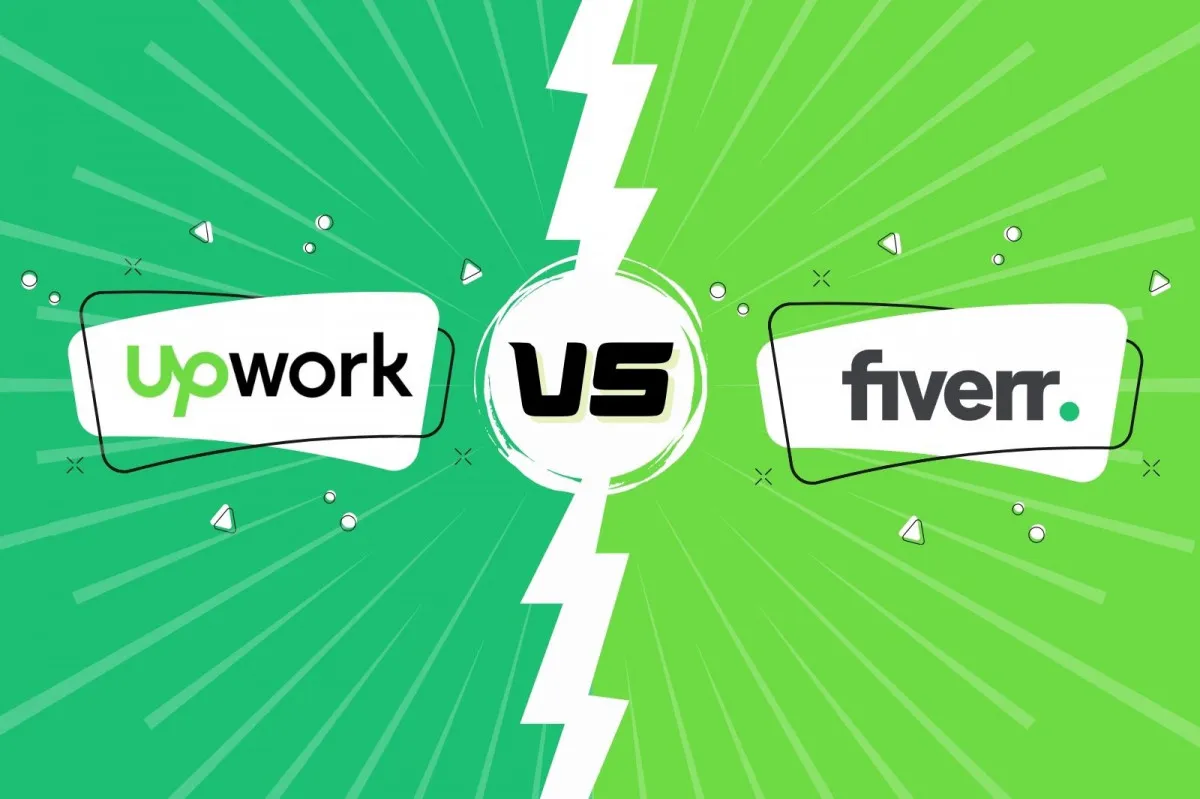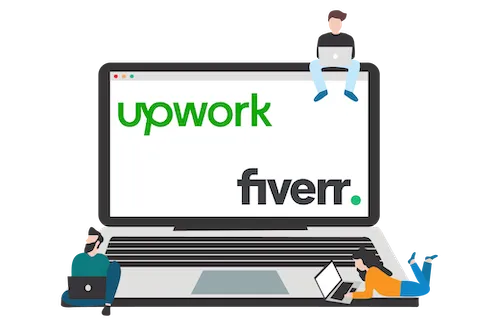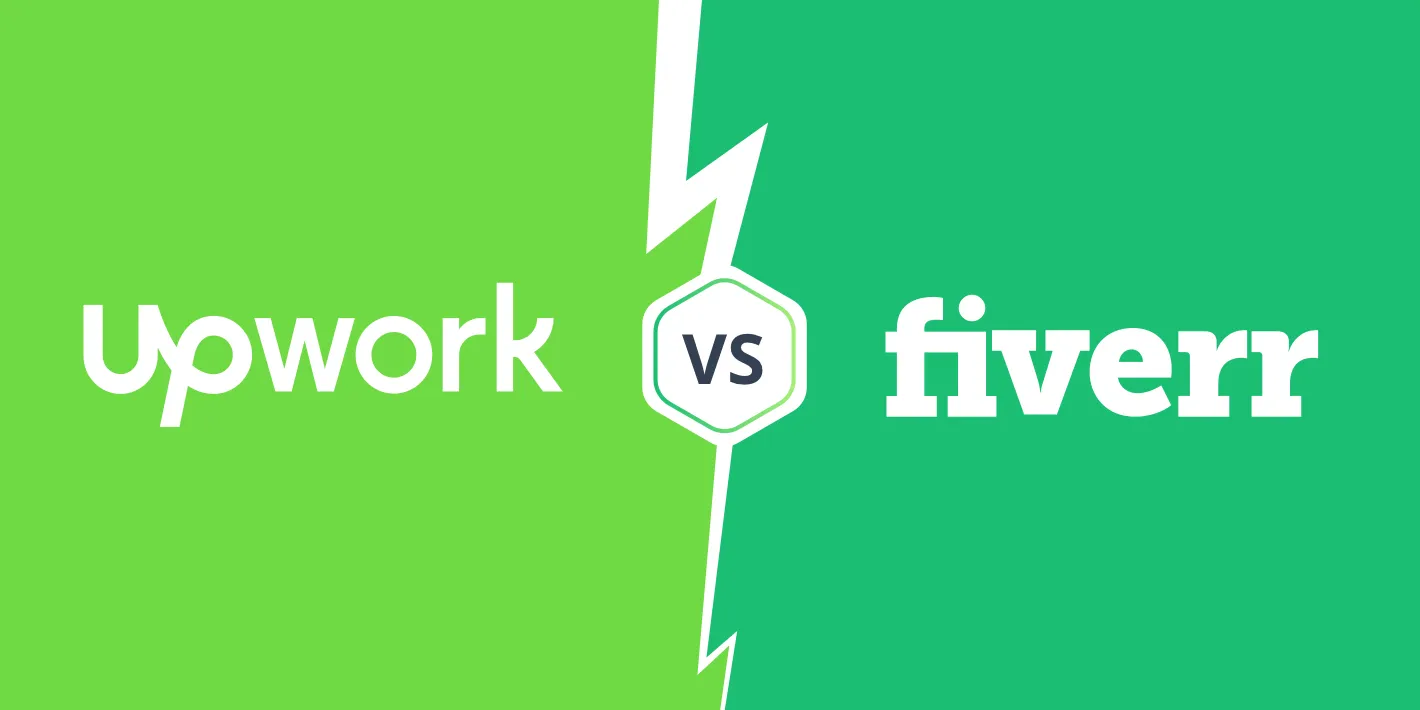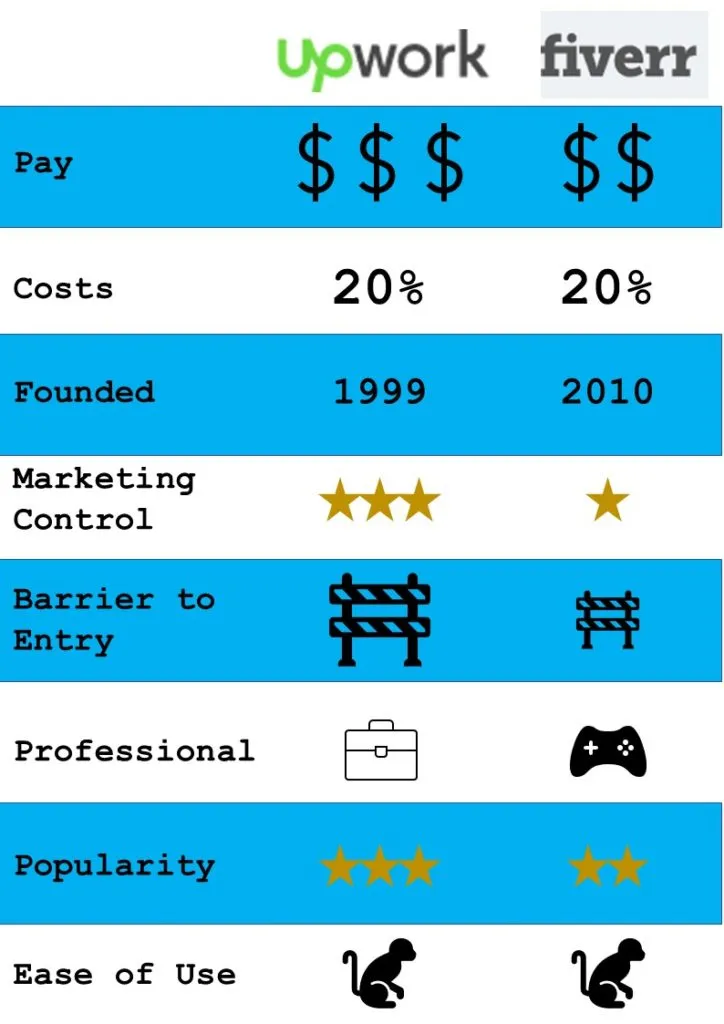In the world of freelancing, two platforms often stand out: Upwork and Fiverr. Both have gained immense popularity among freelancers and businesses looking for services, but they operate quite differently. So, is Upwork the same as Fiverr? In this post, we’ll dive into each platform’s unique features, pros, and cons, and help you understand how they compare to one another.
Overview of Upwork

Upwork is one of the leading freelancing platforms, connecting businesses with remote professionals across a myriad of categories. Whether you’re looking for a graphic designer, writer, programmer, or virtual assistant, Upwork serves as a marketplace that caters to various industries.
Founded in 2015, Upwork emerged from the merger of two companies, Elance and oDesk, and has since evolved to become a go-to resource for businesses looking to recruit skilled freelance talent. Here are some key features of Upwork:
- Job Posting: Clients can post specific job listings, detailing the tasks, budget, and timeline they have in mind.
- Freelancer Search: Clients can browse freelancer profiles, which include feedback, ratings, and portfolios, making it easier to find qualified candidates.
- Bidding System: Freelancers can submit proposals for jobs, allowing them to pitch their skills and negotiate terms.
- Escrow Payment System: Upwork operates an escrow account, providing security for both parties until the work is completed satisfactorily.
- Time Tracking: For hourly contracts, freelancers can use Upwork's time tracking tool to log their hours and share their work progress.
Overall, Upwork focuses on providing a comprehensive environment for longer-term projects and more complex freelance work, allowing clients and freelancers to develop more intricate working relationships.
Also Read This: Do I Get the Copyright to Fiverr Logos?
Overview of Fiverr

Fiverr is a popular online marketplace that connects freelancers with clients seeking various services ranging from graphic design to digital marketing, writing, and much more. Founded in 2010, Fiverr revolutionized the gig economy by allowing people to offer their services, known as “gigs,” starting at just $5—hence the name.
One of the unique features of Fiverr is its user-friendly platform where freelancers can create profiles showcasing their skills, work samples, and pricing. Clients can easily browse through these profiles, making it simple to find a match based on their needs. Moreover, Fiverr covers a broad spectrum of categories, which can be broadly classified into:
- Graphics & Design: Logo design, business cards, illustration, and much more.
- Digital Marketing: SEO services, social media management, and content marketing.
- Writing & Translation: Copywriting, blog writing, and translations.
- Video & Animation: Video editing, animation, and promotional videos.
- Music & Audio: Voiceovers, music production, and audio editing.
Another interesting aspect is Fiverr’s tier system, where freelancers can offer different packages—basic, standard, and premium—allowing clients to choose the level of service that suits their budget. Overall, Fiverr thrives on a more straightforward, productized approach to selling services, making it a go-to platform for many freelancers and clients alike.
Also Read This: How to Leave a Tip After Completing an Order on Fiverr
Key Differences Between Upwork and Fiverr

While both Upwork and Fiverr serve as platforms connecting freelancers with clients, they operate under quite different models and characteristics that cater to varied needs. Here are some of the key differences:
| Aspect | Upwork | Fiverr |
|---|---|---|
| Service Model | Freelancers bid on projects | Freelancers offer set gigs |
| Pricing Structure | Hourly or project-based pricing | Fixed pricing starting at $5 |
| Target Audience | Businesses needing skilled professionals for complex tasks | Individuals and small businesses for quick, affordable gigs |
| Verification Process | More rigorous vetting for freelancers | Self-published profiles with user reviews |
| Communication | Project-based communication | Direct messaging for gigs |
In summary, Upwork is tailored more for professional, long-term projects where clients seek specialized skills, while Fiverr is great for quick services at an entry-level price. Understanding these differences can help freelancers and clients choose the right platform for their specific needs.
Also Read This: How to Remove Revision Request on Fiverr
4.1. Business Model

When it comes to freelancing platforms, the business model can shape the entire user experience. So, how do Upwork and Fiverr differ in this regard? Let’s break it down!
*Upwork operates primarily on a bidding system, where freelancers create profiles, showcase their portfolios, and clients post job opportunities. Freelancers submit proposals, outlining how they’ll tackle the project and at what cost. Clients then choose the freelancer they find most suitable. Essentially, Upwork connects clients with freelancers based on proposals and bids.
On the other hand, Fiverr adopts a more straightforward approach. Here, freelancers list their services as "gigs" with set prices starting at $5 (hence the name). Clients can browse through these gigs and purchase directly without much back-and-forth communication. This can feel less intimidating for clients, who might prefer a clear-cut option without going through multiple proposals.
Here’s a quick comparison of their business models:
| Aspect | Upwork | Fiverr |
|---|---|---|
| Operational Model | Bidding System | Gig-based Listings |
| Pricing Flexibility | Freelancer Proposal | Set Prices, Starting at $5 |
| Client Interaction | Direct Communication Before Hiring | Minimal Communication; Purchase Directly |
In conclusion, while both platforms serve the freelancing community, their business models reflect different philosophies and user experiences. Depending on your preference for either bidding or fixed pricing, one may resonate with you more than the other!
Also Read This: How to Optimize My Fiverr: Tips for Success
4.2. Types of Services Offered
Understanding the types of services offered on Upwork and Fiverr is crucial when choosing the right platform. Each has its strengths and unique niches!
Upwork tends to attract more professional freelancers and is well-known for offering services like:
- Software Development
- Data Analysis
- Content Writing and Editing
- Graphic and Web Design
- Project Management
Because Upwork curates a wide array of expert talents, you’ll often find freelancers charging higher rates. This platform is a great choice for businesses looking for long-term collaboration or complex projects that require specific expertise.
Meanwhile, Fiverr* is home to a diverse range of services, often focusing on more creative and unique offerings. Some popular services include:
- Logo and Graphic Design
- Video Animation and Editing
- Social Media Marketing
- Voiceover Services
- Writing Services (e.g., blog posts, advertisements)
Fiverr is particularly appealing for quick, one-off tasks or when someone wants to experiment with new ideas without committing to larger projects. The gigs often cater to different budgets, making it accessible for individuals and small businesses alike.
In summary, while both platforms offer a vast array of services, Upwork is more suited for professional and specialized fields, whereas Fiverr shines in creative, quick-fix solutions. Your choice would depend on your specific project needs and the level of expertise required!
Also Read This: How to Refund Fiverr: A Complete Guide
4.3 Pricing Structures
When diving into the world of freelancing platforms, one of the first things you'll notice is that Upwork and Fiverr adopt very different pricing structures. Understanding these differences can help you decide which platform is best suited for your needs—whether you’re a freelancer or a client.
Fiverr: Fiverr operates on a gig-based model. Freelancers, also known as sellers, create service listings starting at $5, hence the name “Fiverr.” While the base price is low, many sellers offer tiered pricing packages, which can range from $5 to hundreds of dollars depending on the complexity and scope of the service. Extras can also be added to the gigs, increasing the overall cost.
- Base Price: Starts at $5
- Tiered Pricing: Packages can go up significantly based on service level
- Extras: Add-ons can be included for additional charges
Upwork: On the other hand, Upwork uses a more flexible hourly or project-based rate. Freelancers set their own hourly rates or can provide a flat project fee. Clients post jobs with budget constraints, and freelancers can bid based on those budgets. This setup can create a more competitive environment, but it can also lead to varied pricing.
- Hourly Rates: Freelancers set their own rates
- Project Budgets: Clients can dictate budget limits
- Bidding System: Freelancers compete for jobs by submitting proposals
The ability to customize pricing structures on both platforms makes each unique in its approach, catering to different preferences and market expectations. So while Fiverr provides clear, straightforward pricing, Upwork offers flexibility that can be appealing to both freelancers and clients alike.
Also Read This: How to Stay Online on Fiverr 24/7
4.4 Target Audience
Understanding the target audience for Upwork and Fiverr can significantly influence your choice in which platform to use. Each platform attracts different types of clients and freelancers, based on their specific needs and working styles.
Fiverr: This platform is particularly popular among clients looking for quick, budget-friendly solutions. It’s a go-to for small businesses, startups, and individuals needing specific tasks completed promptly. The gig-based nature of Fiverr works well for clients who require particular services like graphic design, writing, or digital marketing without the need for extensive collaboration. It's perfect for:
- Small Businesses: Seeking affordable options
- Individuals: Having smaller tasks that need quick turnarounds
- Entrepreneurs: Looking for specific services delivered efficiently
Upwork: In contrast, Upwork appeals to a broader spectrum of clients and freelancers, particularly those involved in more complex projects requiring ongoing support or collaborative efforts. This includes larger enterprises, agencies, and companies looking for long-term team members or project-based hiring. Key audiences for Upwork include:
- Large Enterprises: Requiring dedicated freelancers for long-term projects
- Agencies: Looking for specialized talent
- Experienced Professionals: Seeking substantial projects or corporate work
Ultimately, the choice between Upwork and Fiverr comes down to the scope of work, budget, and the kind of collaboration you envision. By understanding each platform's target audience, you can make a more informed decision that aligns with your specific needs.
Also Read This: How to Hustle on Fiverr: Maximizing Your Earnings
5. Pros and Cons of Upwork
Upwork has become a leading platform for freelancers and clients alike, offering a range of features that cater to both groups. However, like any service, it comes with its own set of pros and cons.
Pros of Upwork:
- Diverse Talent Pool: Upwork boasts millions of freelancers across various fields, making it easier to find the perfect match for your project.
- Robust Project Management Tools: The platform provides integrated tools for time tracking, milestone setting, and reporting, allowing clients to manage their projects efficiently.
- Variety of Job Types: Whether you need a one-off task or ongoing work, Upwork accommodates everything from short gigs to long-term contracts.
- Payment Protection: Upwork offers escrow services, which means funds are securely held and only released once you’re satisfied with the work.
Cons of Upwork:
- High Fees: Upwork charges freelancers a service fee that can range from 5% to 20% based on their earnings, which can cut into their profits.
- Time-Consuming Hiring Process: With so many freelancers available, clients might spend more time sifting through proposals than they’d like.
- Strict Rules and Guidelines: Upwork has a detailed set of rules that may be restrictive for both freelancers and clients, leading to potential frustrations.
- Competition: The platform can be competitive, making it difficult for newcomers to land jobs without a solid reputation.
Also Read This: How to Attach a File in Fiverr: A Step-by-Step Guide
6. Pros and Cons of Fiverr
Fiverr has made a name for itself as a go-to marketplace for freelance services, but it’s essential to weigh both its advantages and disadvantages before diving in.
Pros of Fiverr:
- Affordability: Fiverr offers services starting from just $5, making it accessible for individuals and small businesses with tight budgets.
- Easy to Use: The platform is user-friendly, with simple navigation that allows clients to find services quickly without much hassle.
- Structured Services: Freelancers create service packages, known as "gigs," which clearly outline what clients can expect, reducing misunderstandings.
- Quick Turnaround: Many freelancers on Fiverr market themselves as offering fast delivery, making it a great option for urgent needs.
Cons of Fiverr:
- Variable Quality: The low entry barrier means that anyone can sell services, leading to highly variable quality among freelancers.
- Service Fees: Fiverr also charges a service fee to clients, which can add up and potentially discourage purchasing.
- Limited Customization: Unlike Upwork, Fiverr's structured gig system can limit customization options for more complex projects.
- Less Control for Clients: Since freelancers set their own prices and services, clients might find that not every project aligns perfectly with their expectations.
Also Read This: How to Scrape Fiverr Email Addresses
Which Platform is Right for You?
Deciding between Upwork and Fiverr truly hinges on your specific needs, preferences, and professional circumstances. Both platforms cater to freelancers and clients but operate differently, catering to different types of work and client engagement. Here are some key considerations to help you determine which platform might be the best fit for you:
- Type of Work: If you're in a field where projects are typically larger or more complex, Upwork might be ideal. Its structure supports long-term contracts and ongoing client relationships. Conversely, if you offer a distinct service that can be packaged neatly, Fiverr can be a great choice.
- Budget: Fiverr is known for its budget-friendly services, allowing clients to find quick tasks completed at lower costs. However, if quality work is your priority and you're willing to spend more, Upwork’s freelancers often charge higher rates that might reflect their skill and experience.
- Level of Experience: New freelancers might find Fiverr more accessible, thanks to its straightforward service offerings. On the other hand, if you possess a strong portfolio and extensive experience, Upwork might allow you to showcase your skills more effectively, leading to better-paying jobs.
- Work Style: If you prefer a 'set it and forget it' approach, Fiverr's gig-based model may appeal to you. However, if you enjoy iterating with clients and being involved throughout the project lifecycle, Upwork may be more fulfilling.
Ultimately, assess what matters most in your freelance journey—whether it's flexibility, skills showcase, ongoing relationships, or budget—and you'll find your answer!
Conclusion
In wrapping up our comparison, it’s clear that both Upwork and Fiverr have their unique advantages and disadvantages. While they both serve the freelance market, their operational structures and user experiences differ significantly. Here’s a quick recap:
| Feature | Upwork | Fiverr |
|---|---|---|
| Project Type | Complex, Large Projects | Quick Tasks, Smaller Services |
| Payment Structure | Hourly or Project-based | Fixed Price (Gigs) |
| Freelancer Experience | Primarily Experienced Freelancers | Varied Experience Levels |
| Client Engagement | Ongoing Relationships | Minimal (One-Off Services) |
When choosing between Upwork and Fiverr, ask yourself some vital questions. What type of work are you looking for? How much are you willing to spend? What kind of relationship do you want to nurture with your clients? Taking time to reflect on these factors will empower you to make an informed decision that best suits your professional aspirations. Whether you choose Upwork, Fiverr, or a combination of both, the right platform can undoubtedly enhance your freelance journey!



